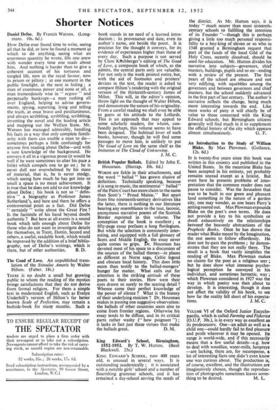KING EDWARD'S SCHOOL, DOW 400 years old, is unusual in
several ways. It is outstanding academically ; it is associated with a notable girls' school and a number of flourishing grammar schools, and it has remained a day-school serving the needs of the district. As Mr. Hutton says, it is today " much nearer than most sixteenth- century schools to fulfilling the intention of its Founder "—though this is perhaps giving a little too much personal responsi- bility to a boy-king of eleven or so who in 1548 granted a Birmingham request that part of the funds of the local Gild of the Holy Cross, recently dissolved, should be used for education. Mr. Hutton divides his narrative into subjects—governors, chief Masters, buildings, pupils and so on—ending with a review of the present. The first Years of the school are obscure and not very edifying, with squabbles among the governors and between governors and chief masters, but the school suddenly advanced in the first part of last century. The author's narrative reflects the change, being much more interesting towards the end. Like most works of piety it will chiefly be of value to those concerned with the King Edward schools, but Birmingham citizens generally will find much in it to supplement the official history of the city which-appears almost simultaneously. G. F.


































 Previous page
Previous page